In Their Own Words
A bibliography of working-class autobiographies from the 18th and 19th centuries
Over 10 million people lived in England at the time of the 1801 census. We know plenty about the lives of the landed gentry, thanks to the extensive written record they left behind and the enduring popularity of the time period among historians and novelists alike. But it's more difficult to learn about the experiences, opinions and dreams of the rest of the population.
In the age before widespread literacy, most working men and women left little or no written trace of their lives besides the record of their births, deaths and marriages. They tend to appear on paper only on the most exceptional and difficult occasions: in court proceedings, Poor Law records, the petitions of mothers hoping to have their child admitted to a foundling hospital, the accounts of dire living conditions written by well-meaning philanthropists…
Fortunately, there exists a considerable body of academic work on the subject of the working classes during the Industrial Revolution.
But what about the accounts written in their own words?
Collections of working-class autobiographies from Georgian and Victorian Britain
(Note: The following works concentrate on England, and very occasionally Scotland or Wales.)
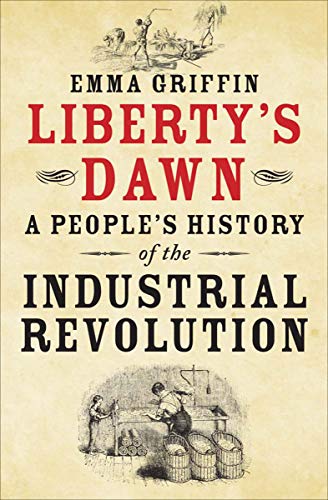 Liberty’s Dawn: A People’s History of the Industrial Revolution by Emma Griffin
Liberty’s Dawn: A People’s History of the Industrial Revolution by Emma Griffin
Chapters covering marriage, attitudes to sex, participation in religious and political organisations, and the working lives of men, women and children, summarising the author’s findings from the study of hundreds of memoirs and other life writings.
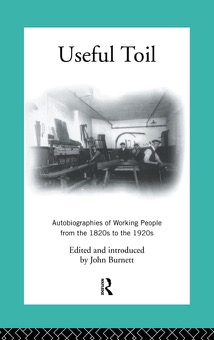 Useful Toil: Autobiographies of Working People from the 1820s to the 1920s by John Burnett
Useful Toil: Autobiographies of Working People from the 1820s to the 1920s by John Burnett
Extensive extracts, with detailed commentary, from the writings of twenty-seven servants, labourers and artisans.
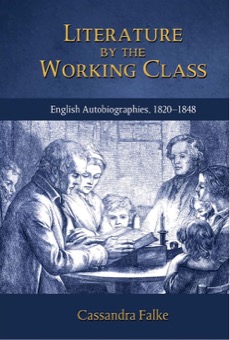 Literature by the Working Class: English Autobiographies, 1820–1848 by Cassandra Falke
Literature by the Working Class: English Autobiographies, 1820–1848 by Cassandra Falke
A detailed exploration of the autobiographies of five working men in the mid 19th century. The emphasis is not on what we can learn about the “statistically average” life experience, but rather on a literary analysis of the texts.
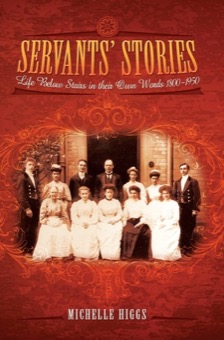 Servants’ Stories: Life Below Stairs in Their Own Words, 1800-1950 by Michelle Higgs
Servants’ Stories: Life Below Stairs in Their Own Words, 1800-1950 by Michelle Higgs
Extensive extracts from the writings of footmen, maids and other domestic servants, with short commentaries by Higgs.
Hearing from Georgian and Victorian women
In any survey of historical autobiographies, men’s experiences will inevitably dominate, simply because they had a higher literacy rate and have left a greater volume of words. Here are some collections that concentrate on women’s life writings.
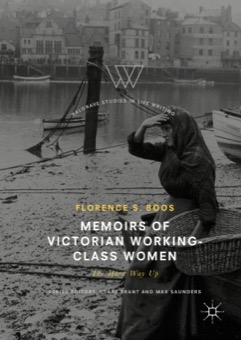 Memoirs of Victorian Working-Class Women: The Hard Way Up by Florence Boos
Memoirs of Victorian Working-Class Women: The Hard Way Up by Florence Boos
An analysis of a wide variety of autobiographical writings from Victorian women, including servants’ memoirs, conversion narratives and popular published works.
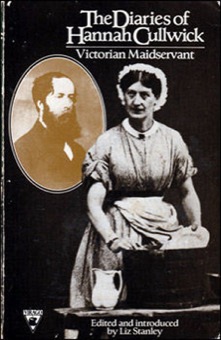 The Diaries of Hannah Cullwick, Victorian Maidservant by Hannah Cullwick
The Diaries of Hannah Cullwick, Victorian Maidservant by Hannah Cullwick
The detailed daily diary of a 19th-century woman, written at the behest of the man she later married.
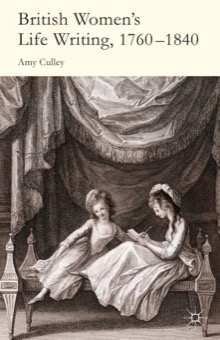 British Women’s Life Writing, 1760–1840 by Amy Culley
British Women’s Life Writing, 1760–1840 by Amy Culley
This book covers all social classes, but contains some chapters on, for example, late eighteenth-century and Regency courtesans, who often came from impoverished or less genteel backgrounds.